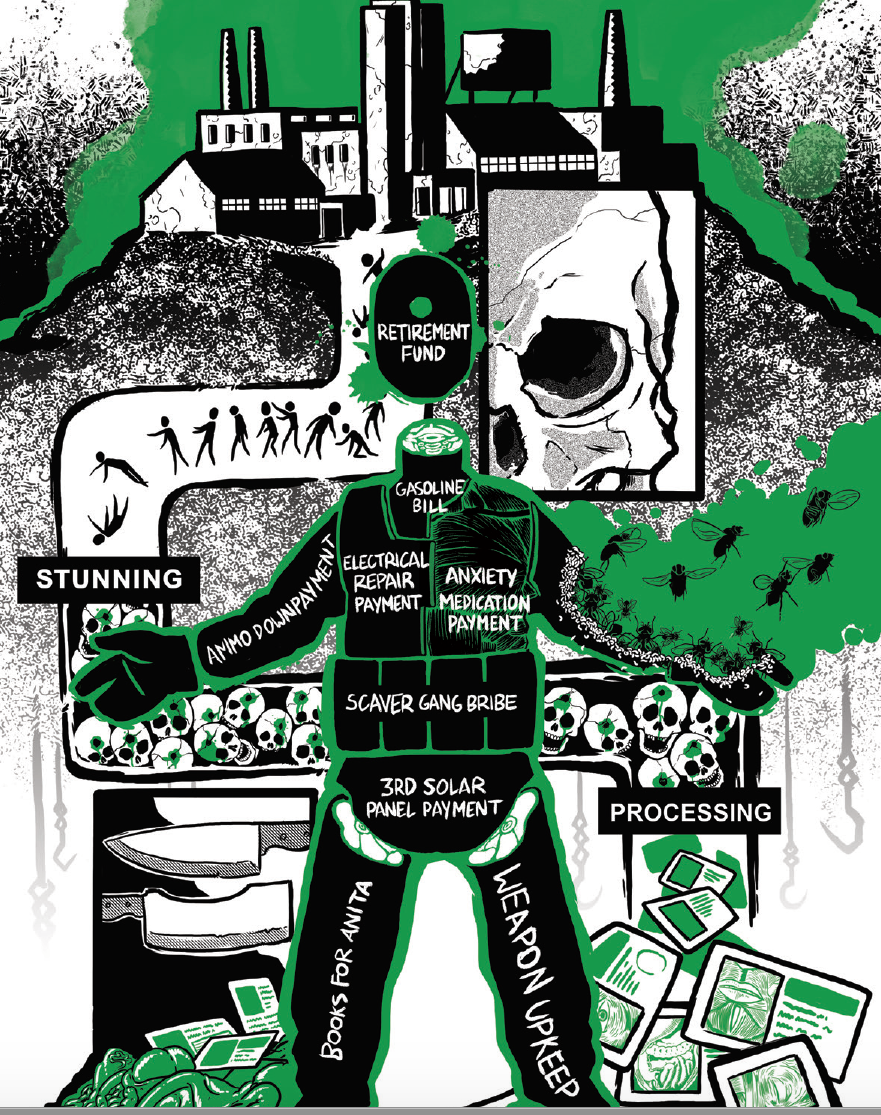First-person shooters (FPS) have a long complicated history with the American military and adventurism. In CoD4: MW, the gameplay is tight, fast-paced, and fun, yes. But the plot is this insane over-the-top mess of geopolitics where a nuke (that never existed in real life) goes off in a stand-in version of Iraq. One of the characters you keep quantum leaping to and from crawls over broken glass and dies from radiation poisoning at a helicopter crash. Depicting the brutal and empty finality of going on foreign misadventures. When you'd die during non-cinematic fights, the screen would blur and you'd get mind-numbingly depressing quotes like "an F-35 costs 1.2 billion dollars", as it prepared to reload your last checkpoint.
Lately, they have taken to openly collaborating with the military. A lot of recent games tout the realism of having Military advisors show developers how SEALS ops break down doors, or they license specific make and models of guns, or laser-sights, which are often doled out piecemeal in the game world, or during the multiplayer, as you massacre your way hundreds of thousands of times against other Westerners playing the good team and bad team.
This is to say that FPS like Six Days in Fallujah are honestly a dime a dozen. There is nothing fundamentally remarkable about a game developer taking a combat situation and making it a hamster wheel simulation for bored American kids to run through, as they are babysat by their Xbox. But there is some controversy brewing just like in 2005-2008. When this game was initially announced a decade ago, games did not have the respect ($$$) they had today and it was deemed disrespectful to the troops. Now, the controversy is whether knowing what we know about the long list of atrocities that occurred in Iraq (1.2+million dead) AND specific war crimes committed in and around the city of Fallujah, is it appropriate to have a game like this see the light of day?
Given that the developers are claiming this game is "not political commentary", it bodes ill for its reception. An uninspired middling shooter, set in the deadliest episode of the Iraq War and utterly unwillingly to explore in a serious manner the actual crimes committed. It'll be just another shooter where you pop from a crouch and shoot down an alley, and run to a checkpoint, with bugs, and disappearing bodies like any other FPS set in a brown, gray and dusty, Middle East country stand-in. When Roger Ebert was still alive, he once claimed that games would never be "Art". Despite many people arguing and declaring various games to the contrary (and hundreds of death threats from gamers — deaths threats and gamers name a more iconic duo); he stood by that claim. As he says:
I agree with him on that much. Most games have a finality to them, a success point. Even if the story is "sad". In CoD2 set back in 1940 you end in Berlin waiving the soviet flag, having pushed nazi forces back whence they came. In CoD4 Modern Warfare, you stop the big bad from setting off further nukes. Resident Evil ends with you escaping the zombified mansion. In Journey, you ascend to the tallest mountain peak and into the heavens. In Portal 2, you escape the rogue AI and its lab. What is there to win in Six Days of Fallujah? At what cost? Whose story is worth telling, whether in cinema, photography, painting, or video games? If we haven't reckoned with the crimes of Iraq and Afghanistan, why is it acceptable to depict them in 4k, 60 frames per second?
There have always been games that have certain perverse connotations. Cowboys and Indians or cops and robbers, infantilize and oversimplify their dichotomy. Even Chess, with its pawns, and other pieces depicting a world of conflict affecting military and religious offices. But there is a banality about American FPS in general. Games are a team effort, hundreds of people, working thousands of hours, from inception to the final rendering of each death-loop, or ACOG model, gameplay perk, etc. For example, CoD Warzone allows you to unlock White Phosphorous a chemical weapon banned under international law as a perk, a boost to gain the upper hand; no one in the team stopped to think about the message this might send. Six Days in Fallujah will have the player eliminate the digital stand-ins of actual combatants (and they will only be combatants, these game worlds are often thoroughly deserted of civilian men, women, and children) as you explore with WASD or gamepad through the ruins of America's own making. All the while promising you, zero political commentary.
Talking about whether they are or are not art is a bit tiresome to me, because, imo, it's mostly a matter of semantics. "art" is a word that we humans made up. It's not like it's some physical quality that a physicist could identify.
In my opinion, it's reasonable to say that any product of human creativity which is designed to be aesthetically appealing and/or emotionally engaging can be described as art. But that's just me writing a definition of art. Someone else might come up with a different definition. Language is always shifting and different people have different definitions for the same word.
That said, Ebert's argument that it can not be art because it has a goal is a bit silly imo, because it's basically an ex post facto justification. It looks like he started already feeling that games can not be art, and then made up a justification for it. Is there anyone, who, when asked to define what art is and is not, would reply by saying that it does not have 'rules and objectives'? Ebert himself would not have said that until he was forced to make up some arbitrary qualification that would disqualify games while still allowing movies/books/plays/etc.
A better question is if they are or are not good art.
I didn't agree with the idea games can't be art, only that games have win points, and what do those win points say about the objective of the game is banal and evil.
Games are art in the way infantile doodles are art. Or hyper-comercialized pinups or engorged big tiddy men dressed in capes and tights are art. Low tier, art.
Games are not art. Games can contain art however. Is chess or soccer art? I don’t think so, however a chess piece is usually art a soccer ball usually is not.
Spec Ops: The Line should have killed this kind of corridor shooter.
Lately, they have taken to openly collaborating with the military
This has been a thing since America's Army and SOCOM of the early 2000s. I liked the style of FPS where you had a big open environment and the game gave you like a dozen different ways to proceed.
I would classify those as MIL-SIM, not full blown FPS. A distinction without a difference sometimes, but FPS have a more blockbuster feel, so this is the equivalent of Cpt. Marvel openly touting their partnership with the Chairforce for "added realism and drama".
FPS is just a perspective, COD is an action game and Arma is mil-sim they just both happen to share a camera feature.
Spec Ops: The Line should have killed this kind of corridor shooter.
One of my favorite games.
fuckkkk i miss socom 2 hard. i think it was the first ps2 game online and i remember getting the online adapter and getting high as fuck with my friends talking shit on the mic. good times.
Plugging in the online adapter and being so fucking pumped to shoot some dudes and then immediately getting into a game with two or three people abusing the ladder glitch to get under the map and wreck everyone.
Why can't they just make more WWII games? Everybody likes shooting Nazis.
The dense, miserable glut of mediocre WWII games leading up to the release of CoD4 were their own bland plague of filler in game libraries back in the day. People were severely tired of playing WWII games at that point, to where game reviews would often openly mock a game for being set during WWII.
Is it bad that I kind of want to see a return to WWII/ historical shooters? I’m personally tired of this futuristic trend shooters have been aiming towards and I missed out on the WWII craze. Battlefield V doesn’t scratch that itch.
It was theoretically going to be the next big update too, sadly. Shame because Dice really upped their game with the Pacific War update.
What I really want is a Russian civil war game but since we can't have nice things under capitalism I would be fine settling for a good WWII game where I get to kill Nazis. Bonus points of I can play as the Soviets.
Battlefield 1 Russian DLC has Russian Civil War factions and maps. Only multiplayer though but it's cool to see
It's not so much that WWII was overrepresented, it's just that theaters outside of the Western and Eastern Front were severely underrepresented. It's why the inclusion of the Pacific campaign in World at War was so refreshing and served as a nice contrast to the more "civilized" setting of Berlin.
I just want to see a good game featuring the Second Sino-Japanese War or Chinese Civil War, but we can't have that apparently. :china:
My pet conspiracy theory is that all media started doing zombie stories because it's easier than inventing creative alien designs.
It's unforgivable that AI basically hasn't advanced since Half Life 2 and F.E.A.R. With all of the advancements in machine learning, you'd think you could train up a god-tier AI for pretty much any game and then throttle it up and down to make the different difficulty settings.
Guess I'll throw my undereducated hat in, but I think the problem often with videogame A.I. isn't so much as making it 'good' or 'smart' in regards to the mechanics of the game, but making it all seem so to the player and manage the challenge they have to face. It's piss simple to make an A.I that can kick players ass at the game, home field advantage, it's harder to make it do things that are immersive and realistic. For instance; in Total War games, the A.I is technically all knowing and all capable since it is the game itself you play against, so the challenge isn't making the A.I. do smart things as such, but simulate the actions of independent nations to make the player believe that's happening. Another example is the exalted A.I of F.E.A.R is also a trick, the enemies can do some things most can't, but the illusion making them seem smarter was the audio callouts and barks they shouted in combat
that's not so much a conspiracy theory as a animators are lazy theory
I feel like we don't want that, actually. There's been a strange "shift" in gaming over the last few years I can feel in my bones where Russians/Soviets must always be depicted as literal animals doing evil for no reason, see the last few COD games, Modern Warfare and Cold War especially. I feel like gaming studios and the companies controlling them have really began to understand politics and their role as a form of mass media in holding the ideological line of empire, plus gamers are often reactionary so it caters to their tastes. If a WW2 game came out today with a Soviet campaign or whatever it would be painfully "morally gray" in how it presents the conflict with the end result ultimately depicting the USSR as near equivalent to the Nazis, a favorite tactic of American writers.
It's the exact same as shoot and cry movies, most of those never come close to having a war is bad message but they just want to feel nuanced and profound while being pure ideological justification for forever war
One obvious difference between art and games is that you can win a game. It has rules, points, objectives, and an outcome. Santiago might cite an immersive game without points or rules, but I would say then it ceases to be a game and becomes a representation of a story, a novel, a play, dance, a film. Those are things you cannot win; you can only experience them.
Forgive me but this seems kind of arbitrary and largely an issue of semantics. The fact is that there are games without clear end/victory states and it seems like writing those off as being "not really videogames" is less like saying "Marvel movies aren't cinema" and more akin to saying "Marvel movies aren't movies". Lol.
I still believe that the problem isn't gaming as a medium...but rather the problem is the dominant culture that it sort of gestated and came out of. Its an entire industry that in its inception came from and was consumed by an almost exclusively white male upper class techbro culture that when it finally started to take things like "narrative" or "character" seriously, it essentially outsourced it to hollywood. That doesn't even get into the impact of the bush era.
The problem with games and gamers is that when their "art" is subjected to the serious art analysis and critique they claim to desperately want they get fucking scared and angry about what their "art" actually says. They are a group that craves legitimacy but doesn't want to accept the responsibility that comes with it. IE: man babies.
Long term I think videogames will get to a better place....but like a lot of us living in the imperial core...they started from a not ideal place.
To me it seems to be a game from out of time. This is something I'd expect to see come out in the 00s or early 10s. The modern FPS has been moving away from "realistic" military shooter for a long time now and towards more arcade-y gameplay and the ones that are simmy tend to have a less real setting, like PUBG or Tarkov.
But if it came out back then they wouldn't have had to say that it wasn't political, they would just have dedicated it to "our brave soldiers" instead. So it is somewhat different.
Jim Sterling had a fantastic take on the fact that the Devs said they didn’t want to get “political”.
When the pits of history have been mined dry, we see the mining of the recent past looking for the same sparkle but often finding nothing but fool's gold in the pans.
Its a shame you have to buy the game if you want to add a review. Oh well, we must collectively support all negative reviews that crop up
a few meme games where you fight bin Laden
Ah, I remember early 00s Newgrounds.
The game is also unsurprisingly tied to CIA funding, the games creator has admitted to taking cheques from CIA front agencies in the past










